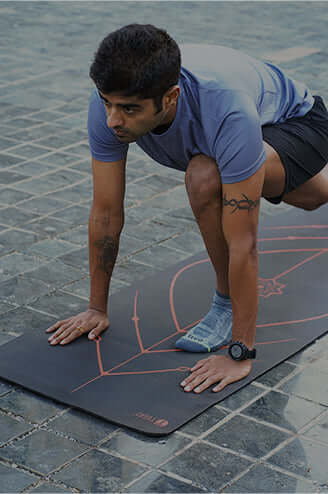You know it’s marathon season when playlists find their tempo, Strava feeds wake up, and watches beep in unison before sunrise. You start to overhear conversations about pace, taper, and timing because this isn’t just running season, it’s commitment in motion, measured not by medals but by the mornings you refuse to skip.
Marathon season isn’t an event on the calendar; it’s an energy shift. From first-timers chasing their first finish to everyday athletes pushing for a personal best, and elites testing new limits: every runner hits the road with the same goal: to see how far discipline can really take them.
Whether you’re entering the season for a 10K or the full 42, here’s what this time truly demands, and how to show up ready.
1. The Mindset: Why This Season Matters
Monsoon months test every runner. Rain offers comfort and excuses in equal measure. When you lace up anyway, you’re choosing discomfort - not for a medal, but for yourself.
That’s what makes running different. It’s not just a sport; it’s a mindset.
It’s the most inclusive sport in the world: no age limits, no prerequisites, no gatekeepers, and even no shoes. The road doesn’t care if you’re fast, seasoned, or starting from scratch. It asks only that you show up.
And every runner speaks the same language: early morning nods, shared sprints at the end of a long run, someone shouting “one more loop!”, a stranger handing out salt candy at just the right moment. Small gestures that remind us why running is more than a fitness trend. It’s a movement, one stride at a time.
Running creates community without trying to. That’s the beauty of it.
2. Training: What Actually Makes You Better
Every runner begins the season with a plan: long runs, tempo days, recovery sessions, and strength work. And then reality happens.
Some days your legs feel like air. Some days, they feel like anchors. Both count. Both matter.
A few simple truths cut through all the noise:
- Consistency beats intensity - three steady weeks matter more than one huge week.
- Rest is part of training - Skipping a run because your body needs it doesn’t set you back; it protects the progress you’ve already made.
- Strength training is imperative - longevity comes when you complement your runs with strength sessions in the weight room.
- You won't follow your spreadsheet perfectly - no one does, and that's fine. The goal is to adapt, not to break.
As taper week approaches, trust the process. Doing less isn’t slacking; it’s your body absorbing months of work.
3. Gear: Keep It Simple, Keep It Reliable
The longer you run, the more you learn:
Good gear is the kind you forget you’re wearing.
Carbon-plated shoes promise speed, and they deliver on race day. But during training? Stability and comfort win. Wet mornings and patchy Indian roads reward traction over tech.
Basic gear that works for most runners:
-
Lightweight, quick-dry fabrics
-
Shoes that match your gait, not your wishlist
-
A cap for sun, rain, and everything in between
-
Socks that won’t rub or bunch
-
A belt or pouch that doesn’t bounce
And then there’s the barefoot runner in every group, chasing “connection” over cushioning. Let them. Running isn’t one-size-fits-all; it’s whatever keeps you injury-free and excited to run again tomorrow.
4. Race Week: The Rules Are Simple
This week is for belief, not experimentation.
Trust the work you’ve already done, the miles, the mornings, the discipline, they’ll carry you farther than any last-minute tweak.
-
No new shoes
-
No new gels
-
No new experiments
Hydrate like you mean it. Sleep like it’s your job. Visualize the course.
Nerves are normal. So is excitement. You’re part of a moving crowd with a shared purpose that’s rare, and it’s powerful.
5. After the Race: The Other Half of Endurance
Walk before you stop- Let the body come down gently.
Stretch the muscles that carried you- Hips, hamstrings, quads, glutes, calves, especially calves.
Refuel with intention- Fast protein and complex carbs don’t just restore energy; they replenish you.
Hydrate like it’s still race day- Electrolytes matter long after the cheers fade.
Rest without guilt- Overtraining is the slowest, quietest injury. Respect the miles by respecting recovery.
6. The Finish Line Isn’t the Point - Showing Up Is
I still remember my first 21K started too fast, faded around 16, and I learned humility one step at a time. Somewhere between fatigue and the roar of the crowd, I realised I wasn’t running to finish.
I was running to remember what I’m capable of when doubt quiets down.That’s the real win, showing up and finding strength you didn’t know you had. Running isn’t about perfect splits or the latest gear. It’s about showing up rain or shine and trusting that every step counts. Marathon isn’t about outpacing others; it’s about outgrowing yourself. It's about patience, consistency, and discovering what you’re made of.
Whether you’re chasing a podium or peace of mind, the road is the same. You’ve started, and that’s reason enough to keep running.
The finish line isn’t the end; it’s proof that you dared to begin.







